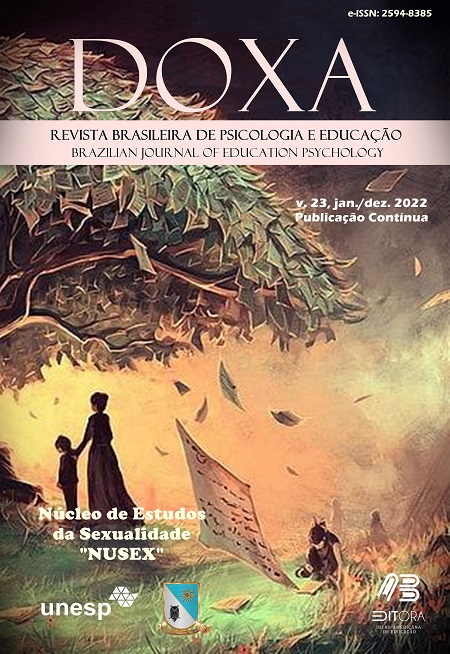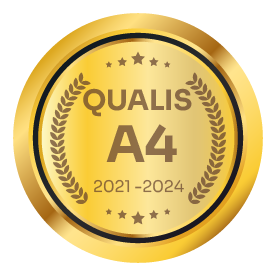La toma de la conciencia en una perspectiva metacognitiva
Posibilidades para el aula
Palabras clave:
Cognición, Metacognición, Monitorización cognitiva, Educación, AprendizajeResumen
Este artículo tiene como objetivo presentar entendimientos sobre la toma de conciencia en una perspectiva metacognitiva. Para ello, inicialmente se ocupa de los aspectos teóricos de la cognición y la metacognición. Luego, se discute la toma de conciencia y las correlaciones percibidas entre ella y la metacognición para, a partir de ahí, presentar una comprensión de la toma de conciencia en una perspectiva metacognitiva. En este contexto, la toma de conciencia se define como un proceso consciente de percepción y reconocimiento que tiene lugar mientras el sujeto desarrolla tareas y afronta situaciones que involucran investigación, de manera que el diálogo que se lleva a cabo dentro de los grupos puede generar mediaciones que provoquen este proceso. La toma de conciencia, en esta perspectiva, tiene como esencia la administración, reflexión y evaluación de las acciones de los propios sujetos y de los fenómenos estudiados por ellos, con el fin de potenciar sus propias actividades cognitivas y metacognitivas.
Descargas
Citas
BEBER, B.; SILVA, E.; BONFIGLIO, S. Metacognição como processo da aprendizagem. Psicopedagogia, v. 31, n. 95, p. 144-151, 2014. Disponível em: http://pepsic.bvsalud.org/pdf/psicoped/v31n95/07.pdf. Acesso em: 10 nov. 2020.
DOLY, A. Metacognição e mediação na escola. In: GRANGEAT, M. (coord.). A metacognição, um apoio ao trabalho dos alunos. Porto: Porto Editora, 1999.
FLAVELL, J. H. Metacognitive aspects of problem solving. In: RESNICK, L. B. (ed.). The nature of intelligence. Hillsdale, NJ: Earlbaum, 1976.
FLAVELL, J. H. Metacognition and cognitive monitoring: a new area of cognitive – developmental inquiry. American Psychologist, v. 34, n. 10, p. 906-911, 1979.
FLAVELL, J. H.; WELLMAN, H. M. Metamemory. In: KAIL, R.; HAGEN, J. W. (ed.). Perspectives on the development of memory and cognition. Hillsdale, N. J.: Erlbaum, p. 3-33, 1977.
GONZÁLEZ, F. E. Acerca de la metacognición. Paradigma, v. 14, n. 1-2, p. 109-135, 1996. Disponível em: http://revistaparadigma.online/ojs/index.php/paradigma/article/view/184/182. Acesso em: 20 dez. 2020.
GONZÁLEZ, F. E. Metacognición y aprendizaje estratégico. Revista Integra Educativa, v. 2, n. 2, p. 127-136, 2009. Disponível em: http://www.scielo.org.bo/pdf/rieiii/v2n2/n02a05.pdf. Acesso em: 25 jan. 2021.
GRANGEAT, M. A metacognição, um apoio ao trabalho dos alunos. Porto: Porto Editora, 1999.
GUIMARÃES, S. R. K.; STOLTZ, T.; BOSSE, V. R. P. Da tomada de consciência à metacognição. In: GUIMARÃES, S. R. K.; STOLTZ, T. (org.). Tomada de consciência e conhecimento metacognitivo. Curitiba: Editora UFPR, 2008.
MARINI-FILHO, R.; STOLTZ, T. Aprendizagem baseada em problemas, metacognição e tomada de consciência: reflexões sobre um estudo transversal. In: GUIMARÃES, S. R. K.; STOLTZ, T. (org.). Tomada de consciência e conhecimento metacognitivo. Curitiba: Editora UFPR, 2008.
PORTILHO, E. Como se aprende? Estratégias, estilos e metacognição. 2. ed. Rio de janeiro: Wak, 2011.
ROSA, C. T. W. A metacognição e as atividades experimentais no ensino de Física. 2011. 346 f. Tese (Doutorado em Educação Científica e Tecnológica) – Universidade Federal de Santa Catarina, UFSC, Florianópolis, 2011.
TOVAR-GÁLVEZ, J. C. Modelo metacognitivo como integrador de estrategias de enseñanza y estrategias de aprendizaje de las ciencias, y su relación con las competencias. Revista Iberoamericana de Educación, v. 46, n. 7, p. 1-9, 2008. Disponível em: https://rieoei.org/RIE/article/view/1916. Acesso em: 24 nov. 2020.
VERTUAN, R. E. Práticas de Monitoramento Cognitivo em Atividades de Modelagem Matemática. 2013. 247 f. Tese (Doutorado em Ensino de Ciências e Educação Matemática) – Universidade Estadual de Londrina, UEL, Londrina, 2013.
VERTUAN, R. E.; ALMEIDA, L. M. W. Práticas de monitoramento cognitivo em atividades de modelagem Matemática. Bolema, Rio Claro, v. 30, n. 56, p. 1070-1091, dez. 2016. Disponível: https://www.scielo.br/j/bolema/a/FchCbsSq9rJrf8bHJMKJqdt/abstract/?lang=pt. Acesso em: 23 fev. 2021.
VYGOTSKY, L. S. Pensamento e linguagem. 1. ed. São Paulo: Martins Fontes, 1987.
YANNI-PLANTEVIN, E. Metacognição e relação com o saber. In: GRANGEAT, M. (coord.). A metacognição, um apoio ao trabalho dos alunos. Porto: Porto Editora, 1999.
Publicado
Cómo citar
Número
Sección
Licencia
Derechos de autor 2022 DOXA: Revista Brasileira de Psicologia e Educação

Esta obra está bajo una licencia internacional Creative Commons Atribución-NoComercial-CompartirIgual 4.0.
Manuscritos aceitos e publicados são de propriedade da Doxa. É vedada a submissão integral ou parcial do manuscrito a qualquer outro periódico. A responsabilidade do conteúdo dos artigos é exclusiva dos autores. É vedada a tradução para outro idioma sem a autorização escrita do Editor ouvida a Comissão Editorial.






